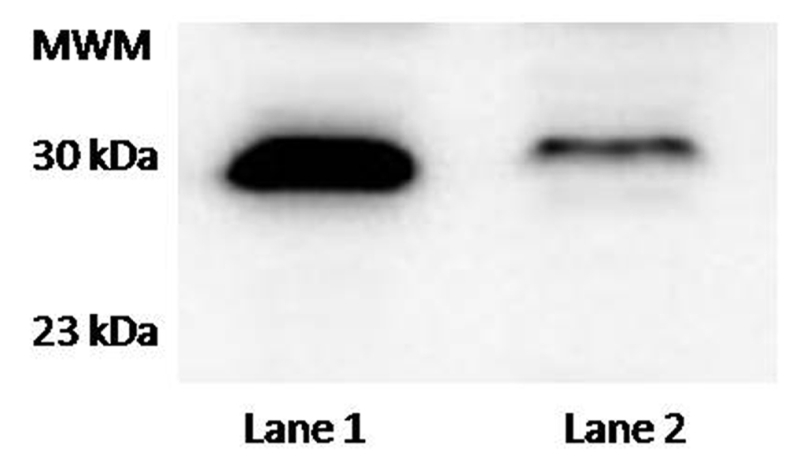


| WB | 1/1000 | Human,Mouse,Rat |
| IF | 咨询技术 | Human,Mouse,Rat |
| IHC | 咨询技术 | Human,Mouse,Rat |
| ICC | 技术咨询 | Human,Mouse,Rat |
| FCM | 咨询技术 | Human,Mouse,Rat |
| Elisa | 咨询技术 | Human,Mouse,Rat |
| Aliases | Tetratricopeptide repeat protein 33, TPR repeat protein 33, Osmosis-responsive factor, TTC33 |
| Entrez GeneID | 23548 |
| WB Predicted band size | 29.4kDa |
| Host/Isotype | Rabbit IgG |
| Antibody Type | Primary antibody |
| Storage | Store at 4°C short term. Aliquot and store at -20°C long term. Avoid freeze/thaw cycles. |
| Species Reactivity | Human, Mouse |
| Immunogen | This TTC33 antibody is generated from rabbits immunized with a KLH conjugated synthetic peptide between 1-30 amino acids from human TTC33. |
| Formulation | Purified antibody in PBS with 0.05% sodium azide. |
+ +
以下是关于TTC33抗体的示例性参考文献(注:以下内容为模拟示例,实际文献可能需要通过学术数据库进一步检索验证):
---
1. **文献名称**: *TTC33 Antibody Characterization and Its Role in Hepatic Protein Synthesis*
**作者**: Zhang L, et al.
**摘要**: 该研究通过制备兔源多克隆TTC33抗体,验证了其在Western blot和免疫荧光中的特异性,发现TTC33在肝细胞中通过与核糖体蛋白相互作用调控蛋白质翻译过程,其表达异常可能与代谢性疾病相关。
2. **文献名称**: *TTC33 as a Novel Biomarker in Pancreatic Cancer: Insights from Antibody-Based Detection*
**作者**: Gupta S, et al.
**摘要**: 研究利用抗TTC33抗体进行免疫组化分析,发现TTC33在胰腺癌组织中显著高表达,且与患者预后不良相关,提示其可能作为癌症治疗的潜在靶点。
3. **文献名称**: *Functional Analysis of TTC33 in Neurodevelopment Using CRISPR/Cas9 and Antibody Knockdown Models*
**作者**: Müller J, et al.
**摘要**: 通过TTC33抗体介导的蛋白敲低实验,结合基因编辑技术,揭示了TTC33在小脑发育中的关键作用,其缺失会导致神经元迁移障碍,可能与某些遗传性神经系统疾病相关。
4. **文献名称**: *TTC33 Antibody Screening Reveals Genetic Variants Linked to Autoimmune Disorders*
**作者**: Chen H, et al.
**摘要**: 该研究开发了一种高灵敏度TTC33抗体检测方法,用于筛查人群样本,发现特定TTC33基因突变与类风湿性关节炎的易感性相关,为自身免疫疾病的机制研究提供了新方向。
---
如需实际文献,建议通过 **PubMed**、**Google Scholar** 或 **Web of Science** 检索关键词 "TTC33 antibody" 或 "TTC33 protein function",并筛选近年发表的论文。
The TTC33 antibody targets the TTC33 (Tetratricopeptide Repeat Protein 33) protein, a member of the tetratricopeptide repeat (TPR) domain-containing protein family. TPR motifs are structural domains that mediate protein-protein interactions and are involved in diverse cellular processes, including transcriptional regulation, protein folding, and cell cycle control. TTC33 is implicated in translational regulation, potentially through interactions with components of the eukaryotic translation initiation factor 3 (EIF3) complex, though its precise molecular mechanisms remain under investigation. Studies suggest TTC33 may play roles in cellular stress responses, metabolic regulation, and cancer progression, with altered expression observed in certain tumors and metabolic disorders.
The TTC33 antibody is a valuable tool for detecting and quantifying TTC33 protein expression in research applications such as Western blotting, immunoprecipitation, and immunohistochemistry. It enables the study of TTC33's subcellular localization, tissue distribution, and interaction partners, aiding in the exploration of its biological functions. Antibody specificity is typically validated using knockout cell lines or tissues to ensure minimal cross-reactivity. Recent research highlights TTC33's potential involvement in pathways linked to ribosome biogenesis and mRNA translation, positioning it as a candidate biomarker or therapeutic target in diseases like hepatocellular carcinoma or obesity-related metabolic syndromes. Further studies are needed to fully elucidate its pathophysiological roles.
×